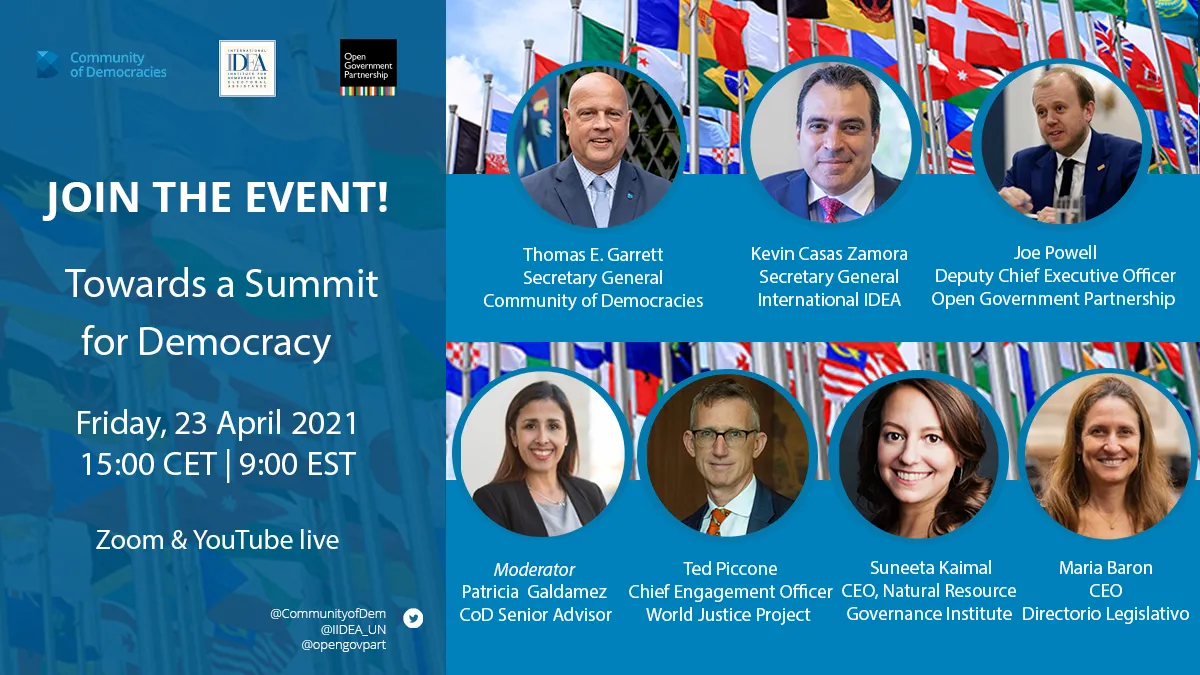
The Community of Democracies (CoD) in cooperation with the International Institute for Democracy and Electoral Assistance (International IDEA), and the Open Government Partnership (OGP), gathered on 23 April to discuss the future of Democracy in accordance with U.S. President Joe Biden’s pledge to rebuild alliances and “renew the spirit and shared purpose of the nations of the free world”, towards a Summit for Democracy.
High-level representatives from the three organizations introduced the current state of democracy and its challenges, as well as practical actions that are required for the advancement of global democracy and sustainable progress. The event was moderated by Patricia Galdamez, Senior Advisor at Community of Democracies, who introduced the speakers and the context of this online discussion on democracy and multilateralism.
“Now, more than ever, there’s a need to protect our democracy”, asserted Ted Piccone, Chief Engagement Officer at World Justice Project, who highlighted the current challenges faced by democracy, such as the rise of authoritarianism, the erosion of the rule of law and the surge of populism and nationalisms across the world. While some challenges were already present before the pandemic, Covid-19 surely impacted all pillars of democracy and limited human rights. Governments, particularly authoritarian ones, hid behind states of emergency and adopted excessive measures in the name of public health—but those measures have often deteriorated liberties and democratic institutions that now suffer and need to be rebuilt.
The proposed Summit for Democracy can be part of a large strategy to set the agenda to support, strengthen, and redesign democracy—which can be achieved through a focus on local, as well as national, institutions. Mr Piccone stated how a bottom-up approach and collective action from strong societies are the key elements of good governance. Additionally, the issue of disinformation was highlighted by Mr Piccone, who called for action in the safeguard of reliable information: “democracies can be better at protecting independent media, investigative journalism and whistleblowers”.
Maria SarungiTsehai, Activist and Founder at Change Tanzania Movement, also emphasized the need for a bottom-up approach, where democracies learn from one another and are built from strong institutions, and where democracy can actually be a right, not a favor. The activist also stressed the role of the rule of law with the dangers of its weakening and pointed out the importance of digital technology when it comes to information and independent press, because it remains the only independent forum where people can still speak up.
Similarly, Thomas E. Garrett, Secretary-General of the Community of Democracies, discussed the role of technology, making a distinction between good and bad technology: digital technology can be an aid to democracy, but “we have to learn how to mitigate technological threats to democracy and human rights”, as authoritarian leaders can use and abuse those technologies and suppress human rights in more deceitful ways in the digital era. Mr Garrett called for collective action to prevent democratic erosion and create inclusive policies that can inspire and craft a new shared purpose for democracy: “democracies can learn from one another”, and now we have the opportunity to overcome recent challenges and start a constructive dialogue.
“What do we need, globally, to better protect democracy? asked Kevin Casas-Zamora, Secretary-General of International IDEA—because it is only through a multilateral and unite approach that we can effectively protect and advance the current state of democracy. A sense of urgency and a sense of humility, indicated Mr Casas-Zamora, are crucial to our global ability to safeguard democracy, and we need to create a plural global network to protect our democratic institutions.
Climate change was also a significant part of the discussion, noted as the upcoming global threat that intersects with the Covid-19 emergency. “We need to understand threats, even the ones that are sly and difficult to identify”, stated International IDEA’s Secretary-General. Suneeta Kaimal, CEO of the Natural Resource Governance Institute, reiterated the interlinkages between climate change and democracy to highlight how corrupt governments and authoritarian regimes can hinder progress and it is only by bringing democracy into the climate discussion that we can achieve global change.
Global Executive Director of Directorio Legislativo & current civil society co-chair of OGP, Maria Baron, addressed the issue of the current division within the United States and the rapid polarization that jeopardizes democracy and institutions. Finally, some more concrete remarks regarding the Summit were made, such as the possible introduction of entry tickets to demonstrate real and tangible commitments to the Summit. Along those lines, Joe Powell, Deputy Chief Executive Officer at Open Government Partnership, suggested a new design for the Summit of Democracy, so that it could bring effective change as result of the Summit, not just abstract intentions.
As a result of this online event, a document will be drafted with highlights of the discussion and a set of key recommendations that aim to respond to the global question of what can be done to advance and enhance democracy, as well as protect it during times of crisis. The Community of Democracies, International IDEA and the Open Government Partnership can provide guidance on how to better implement those recommendations and offer insights on trends around democracy and good governance at the global and local levels.



